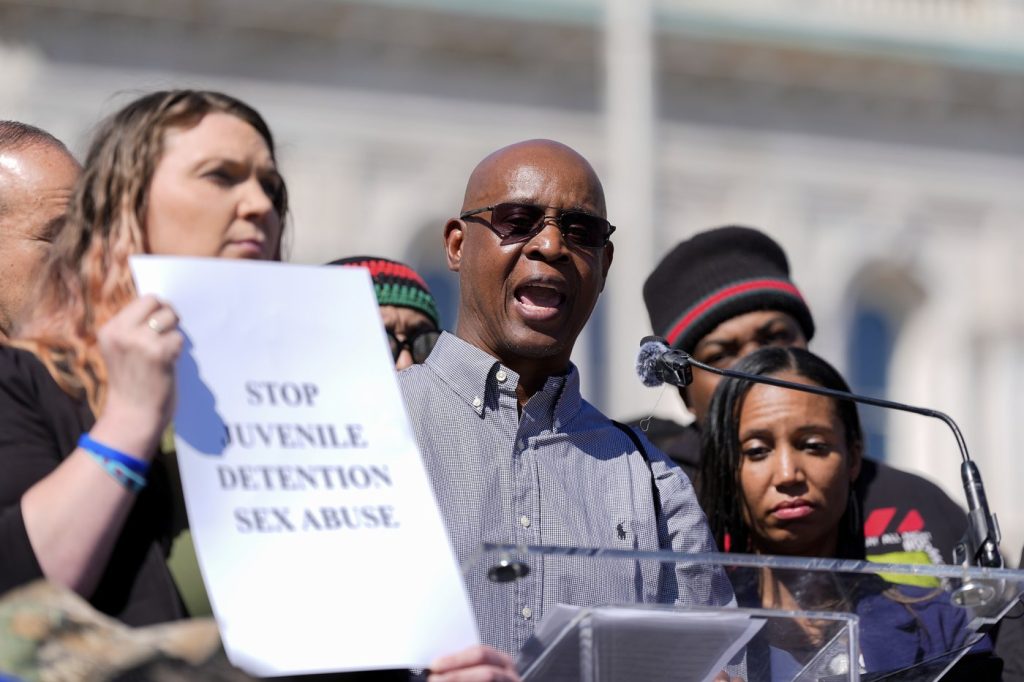BALTIMORE (AP) Arlando “Tray” Jones’s life has been marked by tragedy from a young age. He was just a toddler when Baltimore police killed his father during a robbery, and his mother later succumbed to alcoholism. Left without stable family support, Jones's relatives struggled to provide for him, leading to a life filled with hardships, including poverty and instability.
During these trying times, Jones turned to a notorious local drug dealer, known as “Fat Larry.” This relationship offered him some semblance of stability and money, but it introduced him to a violent lifestyle. By the time he was a teenager, he was carrying a gun and became embroiled in criminal activity, eventually being charged with attempted murder and sentenced to juvenile detention in the early 1980s.
His time at the Maryland Training School for Boys, however, would be traumatic. Jones alleged that a staff member sexually assaulted him multiple times while another guard provided oversight, epitomizing the systemic abuse reported in Maryland’s juvenile detention facilities. These claims reflect a pattern of misconduct that has led to numerous lawsuits, exposing the pervasive sexual abuse that victims like Jones endured during their time in detention.
“They broke me,” Jones recalled, reflecting on his experiences and the degradation he faced. He emphasized the profound impact of this abuse, stating that it stripped him of his humanity. Jones is now one of thousands seeking accountability for the alleged abuses, leveraging a new Maryland state law that removed the statute of limitations for child sexual abuse claims. The legislation was initially intended to address abuses within the Catholic Church but has since opened a floodgate of claims against the state’s juvenile justice system.
Despite receiving numerous requests for interviews, the Maryland Department of Juvenile Services responded with a statement, asserting that it takes allegations of sexual abuse very seriously and is committed to providing humane rehabilitative environments for the youth in its care.
Jones's story is a part of a larger narrative as Maryland confronts the consequences of the Child Victims Act. The change in legislation, which initially allowed victims to file claims regardless of age, has prompted calls for reform within the juvenile justice system amidst fears of financial repercussions for the state. An estimated 6,000 individuals have secured legal representation and have initiated lawsuits, with many demanding not only monetary compensation but also significant changes within the system.
Criticism surrounding Maryland’s juvenile justice system has been ongoing. A 2004 report by the Justice Department highlighted severe physical abuse within the facilities, leading to the closure of some centers. Although oversight has improved and efforts to detain fewer youths have been implemented, advocates claim that the systemic issues persist, particularly for children of color who remain disproportionately affected.
Jones's journey did not end there. After his release from the juvenile facility, he found himself involved in a drug-related altercation that resulted in a murder charge when he was just 16. He was sentenced to life in prison but was released in 2022 due to legislation allowing for sentence reductions for those convicted as children.
During his time in incarceration, Jones utilized his experience to educate himself, earning a bachelor’s degree in psychology and becoming an advocate for prison reform. Today, at 56, he works with Georgetown University’s Prisons and Justice Initiative, engaging in discussions about mass incarceration and reforming the prison system.
Another survivor, Nalisha Gibbs, who faced similar abuses as a minor, speaks out about her traumatic experiences. She was raped by an uncle and subsequently punished for speaking out. During her time in juvenile detention for a minor offense, she was assaulted by a female guard. Gibbs detailed her struggles with addiction and mental health, revealing the long-lasting impact of the abuse she experienced in the system.
As these survivors fight for justice and healing, the broader implications of their stories highlight a critical need for accountability and reform within the juvenile justice system, not only in Maryland but across the United States. The struggles endured by Jones, Gibbs, and countless others signify an urgent call for change and acknowledgment of a dark chapter in the treatment of vulnerable youth.











